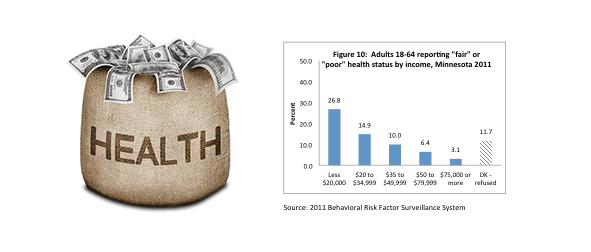

Share
If you have more money, you’re more likely to be healthy, according to a new report by the Minnesota Department of Health. Advocates say it provides more evidence of the need to raise the state’s minimum wage.
The “White Paper on Income and Health” presents research and data on income and poverty in Minnesota and documents the relationship between income and health.
Higher incomes, according to the report, are associated with “increased life expectancy, lower rates of disabilities, lower rates of chronic physical and mental health conditions, lower rates of certain behaviors that can compromise health, and greater access to health insurance and health care,” among many other indicators of health cited in the report. Click here to view a PDF file of the full report.
ISAIAH, a non-profit coalition of over 100 congregations from various faith traditions working in the Twin Cities, St. Cloud and greater Minnesota, held a news conference Monday at the Capitol to announce the report. Commissioner of Health Dr. Edward Ehlinger and Representative Tina Liebling joined the president of ISAIAH, the Rev. Paul Slack.
“No one who works should have to live in poverty,” said Slack, who is pastor of New Creation Church in Minneapolis. “This is a moral issue about how we as a community – as a society – support healthy families. I believe everyone deserves the opportunity to be healthy, but when we pay people low wages we are saying they don’t deserve that opportunity.”
Kristen Godfrey Walters, president-elect of the Minnesota Public Health Association, said health is about more than access to healthcare.
“Socioeconomic factors such as income, employment and education are determinants of health well documented in the public health literature,” she said. “MPHA recommends a raise in minimum wage to an income sufficient to meet subsistence needs such as food, housing, clothing, transportation, and child care.”
Poverty, the report notes, is not equally distributed in Minnesota.
Communities of color experience poverty – and the adverse health impacts of living in poverty – at rates far higher than white Minnesotans. American Indians and populations of color have poverty rates two to four times higher than the rate of whites, and the median household income for African Americans in Minnesota is less than half of the median income for whites.
This is not news for Shaquonica Johnson, a home care worker and mother of two who told her story of working a low-wage job at the press conference.
“I take care of other people for a living,” said Johnson, “but my low pay makes it hard for me to maintain my own health. I am a 37-year-old stroke survivor and I constantly face challenges of getting proper rest and nutrition because I have to work multiple jobs just to pay my bills. Wages and health cannot be separated.”
The report concludes that public policy to increase income is important for improving health.
“The association of lower income with poorer health suggests policies that contribute to increasing income levels, especially among the lowest income groups where improvements in health are most evident in this review, would be expected to have a positive impact on the health of these groups.
“In addition, any discussion of the relationship between income and health must acknowledge that income is not only strongly associated with health, but also is associated with other factors that create the opportunity to be healthy, such as employment opportunities, transportation options, and quality of housing –all of which deserve consideration by policy makers as we seek to create a Minnesota where the opportunity to be healthy is available everywhere and to everyone.”

